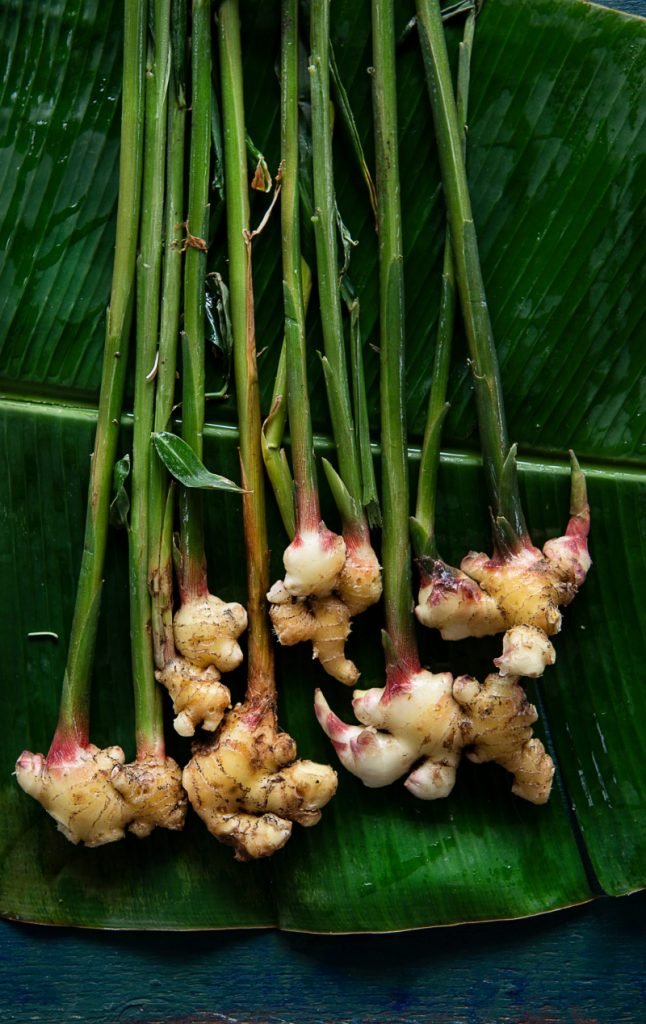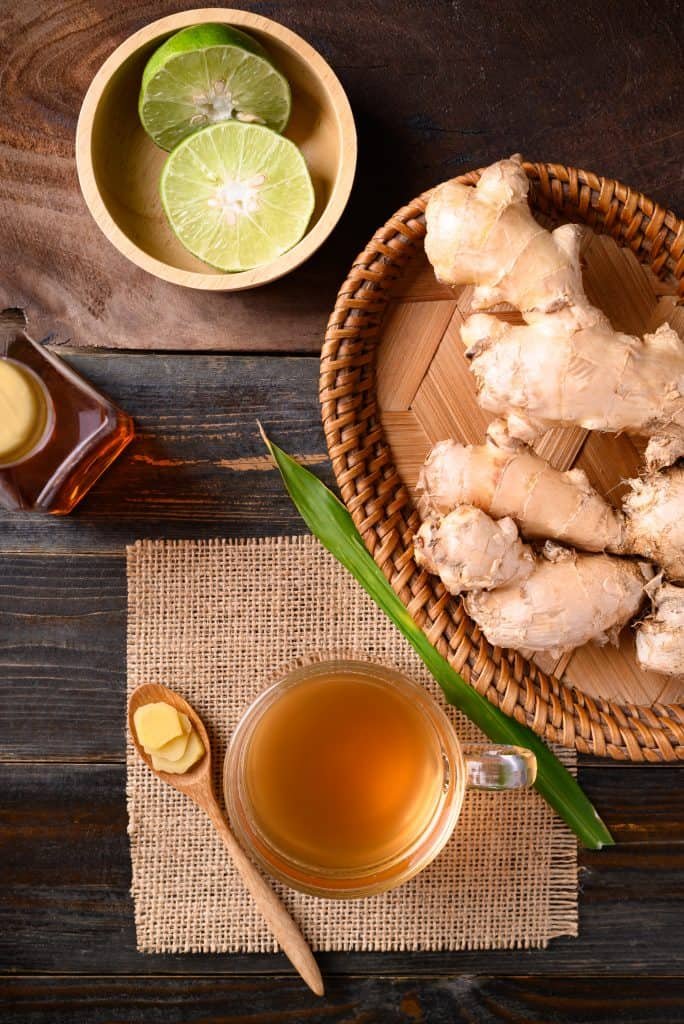What is ginger tea?
Ginger tea is tea made by steeping fresh or dry roots of the ginger plant (Zingiber officinale) in water. It is native to Asia, typically China, India, and Japan where it has had diverse applications in the medical and culinary industries since the 1500s.
Ginger is best known for its ability to fight inflammation and the exquisite taste it imparts on meals from different cuisines all over the world (1).

Nutrition profile
Nutritionally, ginger has a great profile. A 100g serving of raw ginger contains the following (2):
- Energy 80 calories
- Water 78.9g
- Carbohydrates 17.8g
- Protein 1.8g
- Fat 0.7g
- Fiber 2g
Health benefits of ginger tea
Ginger contains certain compounds that have been proven to have beneficial biological activities in the body. They are generally called polyphenols and the most active of them are gingerols, paradols, and shogaols (3).
These bioactive compounds are responsible for the many outstanding health benefits of ginger tea, some of which are discussed below.
Helps to relieve flu symptoms
Drinking ginger tea is efficient in providing relief from symptoms of common cold and other environmental allergies.
This is because ginger is able to decongest the nasal cavity and ease breathing difficulties that arise when one gets a flu or allergies in the environment (4).
Can help fight inflammation
The polyphenol compounds in ginger have very strong anti-inflammatory activities that protect the body from developing inflammation causing diseases like arthritis and colitis.
For example, in the case of arthritis, ginger limits the production of certain chemicals called leukotrienes that are noted for causing inflammation of the joints (5).
Inflammation is the body’s normal defense reaction to combat bacteria or injury to help protect the body. It is characterized by reddening, swelling and pain in the area affected.
However, chronic inflammation, which is prolonged inflammation (that lasts months or years) is detrimental to the health and is the onset for the development of inflammatory diseases (6).
Helps to ease indigestion
Drinking ginger tea helps to relieve indigestion issues like stomach bloating. Ginger helps break up and release gas that is produced during food digestion in the stomach. This helps to relieve bloating and stomach ache (7).
Furthermore, ginger contains a protease enzyme (enzyme that digests protein) called “Zingibain”, which facilitates digestion by increasing the movement of food through the digestive tract. It also enhances the production of digestive enzymes by the body (8).
May help with weight loss
Ginger’s polyphenols inhibit the process of adipogenesis, which is the formation and accumulation of fat-storing cells as adipose tissue in various locations in the body (3).
They also enhance the breakdown of fatty acids, which are the building blocks of fat in the body. When the body fails to breakdown fat for use as energy as it should, these fatty acid molecules accumulate in organs like the heart and liver, which is the genesis of heart and liver disease (9).
Ginger tea can help soothe acid reflux
Gingerols and shogaols in ginger stimulate the production of substances that help to regulate inflammation called anti-inflammatory cytokines. These cytokines help to soothe acid reflux by easing gastric contractions, decreasing swelling and alleviating irritation of the stomach walls (10).
These activities also calm the esophagus as an inflamed and irritated esophagus triggers acid reflux episodes (11).
Moreover, ginger accelerated the movement of food in the digestive tract. This implies the stomach will be emptied faster preventing the backflow of stomach acids into the esophagus (12).
Side effects of drinking ginger tea
Generally ginger is safe to drink, but as with everything else, moderation is key. Drinking too much ginger may cause the following undesirable side effects (1):
- Bloating
- Stomach discomfort
- Mouth and throat irritation
- Heartburn
- diarrhea
Recommendations
Ginger like any other tea or food supplement is not regulated by the FDA. However, experts recommend an upper limit of about 1,000 mg per day which is about 1 teaspoon of raw grated ginger or about 4 cups of ginger tea (14).
References
- Ginger. (n.d.). Retrieved April 17, 2023, from NCCIH website: https://www.nccih.nih.gov/health/ginger
- FoodData central. (n.d.-d). Retrieved April 3, 2022, from Usda.gov website: https://fdc.nal.usda.gov/fdc-app.html#/food-details/169231/nutrients
- Mao, Q.-Q., Xu, X.-Y., Cao, S.-Y., Gan, R.-Y., Corke, H., Trust Beta, & Li, H.-B. (2019). Bioactive Compounds and Bioactivities of Ginger (Zingiber officinale Roscoe). Foods, 8(6). https://doi.org/10.3390/foods8060185
- Akimoto, M., Iizuka, M., Kanematsu, R., Yoshida, M., & Takenaga, K. (2015). Anticancer effect of ginger extract against pancreatic cancer cells mainly through reactive oxygen species-mediated autotic cell death. PloS One, 10(5), e0126605. https://doi.org/10.1371/journal.pone.0126605
- Mashhadi, N. S., Ghiasvand, R., Askari, G., Hariri, M., Darvishi, L., & Mofid, M. R. (2013). Anti-oxidative and anti-inflammatory effects of ginger in health and physical activity: review of current evidence. International Journal of Preventive Medicine, 4(Suppl 1), S36-42. Retrieved from https://www.ncbi.nlm.nih.gov/labs/pmc/articles/PMC3665023/
- Hirsch, J. M. (2011, October 28). Fresh ginger — off the beaten aisle. Retrieved April 3, 2022, from Food Network website: https://www.foodnetwork.com/fn-dish/recipes/2011/10/how-to-use-fresh-ginger
- Anh, N. H., Kim, S. J., Long, N. P., Min, J. E., Yoon, Y. C., Lee, E. G., Kim, M., Kim, T. J., Yang, Y. Y., Son, E. Y., Yoon, S. J., Diem, N. C., Kim, H. M., & Kwon, S. W. (2020). Ginger on human health: A comprehensive systematic review of 109 randomized controlled trials. Nutrients, 12(1), 157. https://doi.org/10.3390/nu12010157
- Nafi, A., Foo, H. L., Jamilah, B., & Ghazali, H. M. (2013). Properties of proteolytic enzyme from ginger (Zingiber officinale Roscoe). International Food Research Journal, 20(1), 363–368. http://dx.doi.org/
- Merritt, J. L., 2nd, Norris, M., & Kanungo, S. (2018). Fatty acid oxidation disorders. Annals of Translational Medicine, 6(24), 473. https://doi.org/10.21037/atm.2018.10.57
- Wei, T.-Y., Hsueh, P.-H., Wen, S.-H., Chen, C.-L., & Wang, C.-C. (2019). The role of tea and coffee in the development of gastroesophageal reflux disease. Tzu Chi Medical Journal, 31(3), 169–176. https://doi.org/10.4103/tcmj.tcmj_48_18
- What Are the 4 Types of Acid Reflux? (n.d.). MedicineNet. Retrieved April 17, 2023, from https://www.medicinenet.com/what_are_the_4_types_of_acid_reflux/article.htm
- Wu, K.-L., Rayner, C. K., Chuah, S.-K., Changchien, C.-S., Lu, S.-N., Chiu, Y.-C., Chiu, K.-W., & Lee, C.-M. (2008). Effects of ginger on gastric emptying and motility in healthy humans. European Journal of Gastroenterology & Hepatology, 20(5), 436–440. https://doi.org/10.1097/MEG.0b013e3282f4b224
- Grøntved, A., Brask, T., Kambskard, J., & Hentzer, E. (1988). Ginger root against seasickness. A controlled trial on the open sea. Acta Oto-Laryngologica, 105(1–2), 45–49. https://doi.org/10.3109/00016488809119444
- Sarah Garone, N. (n.d.). Ginger Tea: Benefits, Side Effects, and Preparations. Verywell Fit. Retrieved April 17, 2023, from https://www.verywellfit.com/ginger-tea-recipe-88180





Pretty section of content. I just stumbled upon your site and in accession capital to assert that I get actually
enjoyed account your blog posts. Any way I’ll be subscribing to your augment
and even I achievement you access consistently rapidly.